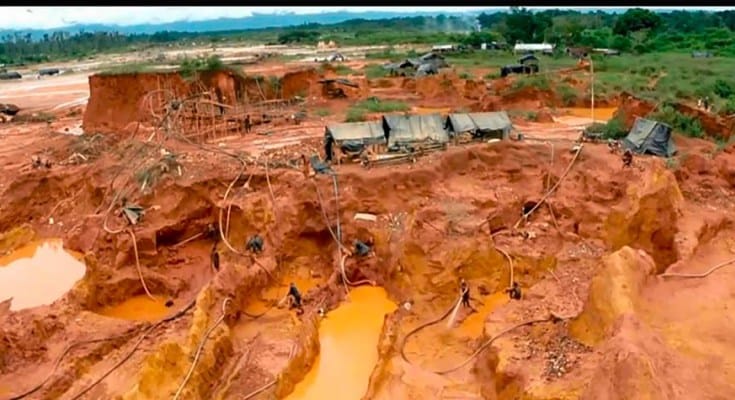
The world must act to stop Venezuela’s environmental destruction
Francisco Dallmeier is the head of the Center for Conservation and Sustainability of the Smithsonian Conservation Biology Institute. Cristina V. Burelli is executive director of V5 Initiative and SOSOrinoco.org.
The political and economic ruin of Venezuela, once one of Latin America’s wealthiest countries, is by now a well-known story. Far less understood are the catastrophic impacts of the crisis on the country’s environment. International action is urgently needed — first to stabilize the downfall, and then to rebuild functional environmental institutions. The fifth session of the U.N. Environment Assembly (UNEA-5) in Nairobi could provide a path to reverting Venezuela’s untenable environmental trajectory.
The dismantling of Venezuela’s environmental institutions and the collapse of its oil sector have generated a chain reaction of unsustainable natural resource extraction. Illegal land grabbing, deforestation and an out-of-control gold rush in protected rainforest areas have created a perfect storm combining environmental degradation with a humanitarian crisis. Massive sediment loads from mining are decimating reservoirs and hydropower generation capacity, while mercury from gold extraction pollutes rivers and sickens people.
Throughout the 20th century, Venezuela, considered among the most biodiverse countries in the world, was a pioneer of sustainable policies. But starting in 1999, the government of Hugo Chávez began to systematically dismantle the country’s environmental protections, despite its progressive, pro-Indigenous rhetoric. “Eco-socialism” replaced functioning institutions, causing an avalanche of ecological disasters that mocked Venezuela’s commitments under the Paris agreement.
The devastation has accelerated under Nicolás Maduro, Chávez’s successor. Since becoming president, Maduro has overseen the total unraveling of Petróleos de Venezuela (PDVSA), Venezuela’s state oil company. PDVSA’s legal revenue from oil exports plummeted from $73 billion in 2011, to $22 billion in 2016, to $743 million in 2020.
Venezuela’s crumbling oil industry no longer reports emissions, but huge amounts of methane and carbon dioxide are added daily to the global climate burden. The lack of infrastructure maintenance causes massive crude oil and pollutant spills with no remediation plans. Critical coastal marine and terrestrial environments are severely affected. The most important oil production regions, especially Lake Maracaibo, the northern Monagas state and the Orinoco oil belt, are degenerating into a mosaic of polluted wastelands.
In 2016, Maduro and his cronies turned to plundering the country’s vast mineral resources as a lifeline to enrich the government elite. To compensate for the losses in oil revenue, Maduro decreed 12 percent of the Venezuelan Amazon — an area bigger than Portugal — as a “mining development region” known as the Arco Minero. This unique rainforest ecosystem, rich in biodiversity, also contains vast reserves of coltan, iron, bauxite, diamonds and, most importantly, gold.
According to Mongabay and Global Forest Watch, illegal mining, logging and collection of firewood for cooking accounted for over 3.2 million lost acres of rainforest between 2001 and 2018, one of the highest deforestation rates in tropical America. RAISG’s 2018 report and SOSOrinoco’s mining footprint map place Venezuela at the top of the list of Amazonian countries with the highest number of illegal mines. Hundreds of mining sectors have been detected, including 59 illegal gold mining clusters in Canaima National Park, a UNESCO World Heritage site, and other protected areas, which are home to 27 Indigenous communities.
Violence and disease plague the mining areas. Roughly 50 percent of reported malaria cases in Latin America are in Venezuela. Of 398,000 reported new cases in 2019, 70 percent were in southern Venezuela. Mining sites are exploited by state and nonstate groups, including the Colombian National Liberation Army (ELN) and the Revolutionary Armed Forces of Colombia (FARC), promoting violence, slave and child labor, prostitution and disintegration of Indigenous social structures.
U.S. sanctions haven’t been effective in bringing about a peaceful democratic transition in Venezuela, nor have they deterred the illicit trade of “blood gold” and other minerals. The effort must now be internationalized. Venezuelan gold buyers, especially Turkey and the United Arab Emirates, should be pressured into following the Organization for Economic Cooperation and Development’s guidance for responsible supply chains of minerals from conflict-affected and high-risk areas.
Venezuelan human rights and environmental groups have raised their voices, but no one seems to be paying attention. International environmental organizations, under threat and unable to operate, fled Venezuela. Stronger leadership from UNESCO is expected given the evidence that Canaima National Park is under siege by illegal mining.
As the world gathers for the UNEA-5 meeting in Nairobi, there is a platform to confront the Maduro regime and stop the ecocide occurring in Venezuela. If the international community, and especially the new U.S. leadership, is serious on the environment and sustainability for the Amazon, the abuses and destruction in Venezuela should be a key part of the agenda and strategy.
